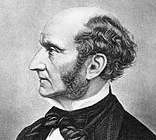J. S. Mill On "Woman"
RETURN
edited 8/19/11
|
As the leading spokesman of scientific positivism in the 19th century, Mill rejected all absolutes and maintained that all propositions must meet the test of experience. Known as the “Saint of Liberalism,” Mill was a courageous proponent of human rights, championing the causes of racial, national, and social minorities. He was also a staunch defender of individual liberty. He developed an elaborate moral calculus which considered both the quantity and quality of happiness and suffering caused by moral choice. Gentle, shy, and awkward with women, Mill became an unlikely champion of their cause. Although Mill never married, he became hopelessly involved in an apparently asexual menage a trois with Harriet Taylor, a married woman and mother. By all accounts, she provoked his worst instincts, and their enduring relationship finally led to Mill’s virtual isolation from his friends and colleagues. Nonetheless, he never ceased to praise her nor to continue his struggle to liberate women from their “state of bondage.”
|
John Stuart Mill (1806-1873) -- philosopher, political economist and Member of Parliament who was a major voice for liberalism in 19th Century England |
|
From the
very earliest twilight of human society, owing to the value placed on her by
man, combined with her inferiority of muscular strength, [woman] was found in a
state of bondage. The
inequality of rights between men and women has no other source than the law of the
strongest. The
principle which regulates the existing social relations between the two
sexes--the legal subordination of one sex to the other--is wrong in itself, and
one of the chief hindrances to human improvement . . The
social subordination of women . . . stands out an isolated fact in modern social
institutions; a solitary breach of what has become their fundamental law; a
single relic of an old world of thought and practice exploded in everything
else, but retained in the one thing of most universal interest; as if a
gigantic dolman or a vast temple of Jupiter Olympius, occupied the site of St.
Paul ‘s and received daily worship, while the surrounding Christian churches
were only resorted to on fasts and festivals. All
men, except the most brutish, desire to have, in the woman most nearly
connected to them, not a forced slave, but a willing one, not a slave merely,
but a favourite. They have therefore put everything in practice to enslave
their minds. The masters of all other slaves rely, for maintaining obedience,
on fear; either fear of themselves, or religious fears. The masters of women
wanted more than simple obedience, and they turned the whole force of education
to effect their purpose. Historians
and philosophers have been led to adopt their [women’s] elevation or debasement
as . . . the surest test and most correct
measure of the civilization of a people or an age. What
is now called the nature of women is an eminently artificial thing--the result
of forced repression in some directions, unnatural stimulation in others. |
